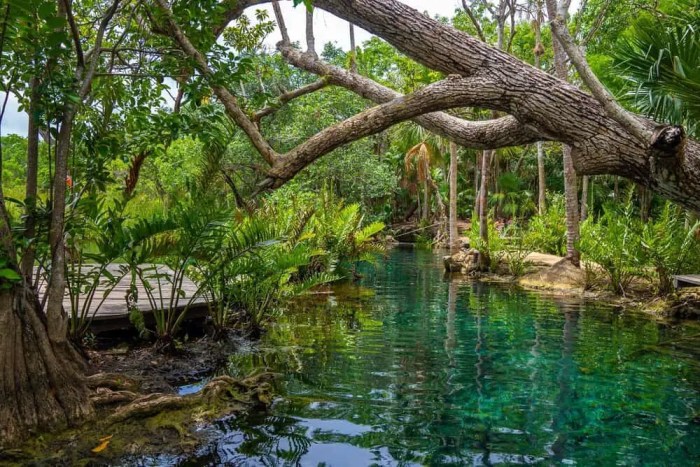As sustainable travel destinations take center stage, this guide invites you on a journey of responsible exploration. Delving into the heart of eco-tourism, we uncover destinations that prioritize environmental preservation, cultural immersion, and community engagement.
From destinations with renowned eco-certifications to those showcasing innovative sustainable transportation options, this guide unveils a world of responsible travel experiences. Embark on a journey that balances wanderlust with a deep commitment to the planet and its people.
Destinations with Eco-Certifications
Eco-certifications play a crucial role in ensuring environmental sustainability in travel destinations. These certifications are awarded to destinations that meet specific criteria for responsible tourism practices, including conservation of natural resources, reduction of carbon emissions, and support for local communities.
By choosing eco-certified destinations, travelers can be assured that their visit is contributing positively to the environment and local economy. These certifications provide a framework for sustainable tourism practices and help protect delicate ecosystems for future generations.
Examples of Eco-Certified Destinations
– Costa Rica: Renowned for its biodiversity and conservation efforts, Costa Rica has received numerous eco-certifications, including the Rainforest Alliance’s Sustainable Tourism Standard and the Green Globe certification.
– Iceland: This country has implemented strict environmental regulations and achieved a high level of renewable energy usage. It has earned the EarthCheck certification for its sustainable tourism practices.
– New Zealand: Known for its pristine landscapes and commitment to responsible tourism, New Zealand has received the Tourism Export Council of New Zealand’s Qualmark Enviro-Gold certification.
Benefits of Choosing Eco-Certified Destinations
– Support sustainable practices: Travelers can actively contribute to the preservation of natural environments and local cultures by choosing eco-certified destinations.
– Enhance travel experiences: Eco-certified destinations often offer unique and authentic experiences that connect travelers with nature and local communities.
– Promote responsible tourism: By selecting eco-certified destinations, travelers can encourage the growth of sustainable tourism practices worldwide.
Sustainable Transportation Options

Sustainable transportation plays a crucial role in tourism by reducing the environmental impact of travel. It involves choosing modes of transportation that minimize greenhouse gas emissions, air pollution, and congestion.
Various eco-friendly transportation options are available, including:
Electric Vehicles
- Zero-emission vehicles powered by electricity, significantly reducing air pollution.
- Destinations like Norway and the Netherlands have extensive electric vehicle charging infrastructure.
Public Transit
- Efficient and affordable way to travel, reducing traffic congestion and emissions.
- Cities like London, Tokyo, and Singapore have well-developed public transit systems.
Cycling
- Zero-emission mode of transportation that promotes physical activity and reduces congestion.
- Destinations like Copenhagen and Amsterdam are renowned for their bike-friendly infrastructure.
Conservation and Biodiversity
Tourism has the potential to play a significant role in protecting biodiversity and promoting conservation efforts. When managed responsibly, tourism can provide financial incentives for local communities to preserve their natural ecosystems and wildlife habitats. This, in turn, can help protect endangered species, maintain genetic diversity, and preserve vital ecological processes.
Destinations can implement various conservation measures to preserve ecosystems, including:
- Establishing protected areas, such as national parks and wildlife sanctuaries, to safeguard habitats and species.
- Implementing sustainable tourism practices, such as limiting visitor numbers, using eco-friendly transportation, and reducing waste.
- Educating tourists about the importance of conservation and encouraging responsible behavior.
- Supporting local conservation organizations and initiatives.
Responsible Wildlife Tourism Practices
Destinations that demonstrate responsible wildlife tourism practices include:
- Galapagos Islands, Ecuador: Known for its unique and fragile ecosystem, the Galapagos Islands have strict regulations in place to protect its wildlife. Visitors are required to stay on designated trails, maintain a respectful distance from animals, and avoid disturbing their natural behavior.
- Kruger National Park, South Africa: One of the largest and most diverse game reserves in Africa, Kruger National Park offers visitors the opportunity to observe wildlife in their natural habitat. The park has a strict anti-poaching policy and limits the number of visitors to ensure minimal impact on the ecosystem.
- Antarctica: As a designated wilderness area, Antarctica is subject to strict environmental regulations. Visitors are required to adhere to guidelines that minimize their impact on the fragile ecosystem, such as avoiding disturbing wildlife, using designated landing sites, and removing all waste.
Local Culture and Community Involvement

Sustainable tourism can positively impact local cultures and communities by preserving traditions, generating income, and promoting cultural exchange. It is crucial to minimize negative impacts and support community engagement to ensure a mutually beneficial relationship.
To mitigate potential drawbacks, it’s essential to respect local customs and traditions, involve community members in decision-making, and ensure that tourism benefits are equitably distributed.
When planning your 2024 travels, consider incorporating sustainable destinations into your itinerary. These destinations prioritize environmental conservation and responsible tourism practices. While exploring the best travel destinations 2024 , seek out experiences that support local communities and minimize your environmental impact.
By embracing sustainable travel, you not only enjoy unique and enriching experiences but also contribute to the preservation of these destinations for future generations.
Examples of Community Engagement and Cultural Preservation
- Bali, Indonesia: The island’s traditional ceremonies, dance performances, and crafts are actively preserved and showcased to visitors, fostering cultural pride and economic opportunities.
- Kyoto, Japan: The city’s ancient temples and traditional tea ceremonies are protected and celebrated, offering tourists a glimpse into Japan’s rich cultural heritage while supporting local artisans and businesses.
- Machu Picchu, Peru: The Inca ruins are managed in collaboration with local communities, ensuring the preservation of the site while providing economic benefits and promoting cultural exchange.
Environmental Impact Reduction
Tourism can have a significant environmental impact, including waste generation, pollution, and resource consumption. Destinations can implement various strategies to reduce these impacts, such as:
Energy Efficiency
Adopting energy-efficient practices in accommodation, transportation, and other tourism-related activities can significantly reduce energy consumption and greenhouse gas emissions. For example, hotels can install energy-efficient lighting, appliances, and HVAC systems.
Water Conservation, Sustainable travel destinations
Water scarcity is a growing concern in many destinations. Implementing water conservation measures, such as low-flow fixtures, rainwater harvesting systems, and efficient irrigation techniques, can help reduce water consumption.
Waste Management
Effective waste management systems are crucial for minimizing the environmental impact of tourism. Destinations can implement waste reduction programs, promote recycling, and establish composting facilities to reduce waste sent to landfills.
Innovative Solutions
Some destinations have implemented innovative solutions to minimize their environmental footprint. For example, the Maldives has launched an ambitious project to build floating solar farms to power its resorts and reduce its reliance on fossil fuels.
Sustainable Accommodation

Choosing sustainable accommodation options is essential for minimizing the environmental impact of travel. Eco-friendly accommodations prioritize energy efficiency, water conservation, waste reduction, and the use of sustainable materials.
When embarking on sustainable travel destinations, it’s essential to pack mindfully. Refer to our comprehensive beach holiday packing list for eco-friendly essentials. From reusable water bottles to biodegradable toiletries, our guide ensures you travel responsibly while enjoying your beach getaway.
As you immerse yourself in these sustainable destinations, remember to minimize your environmental impact and embrace the beauty of nature.
These accommodations typically offer amenities such as low-flow appliances, energy-saving lighting, recycling programs, and organic toiletries. They may also have features like green roofs, solar panels, and rainwater harvesting systems.
While sustainable travel destinations offer a mindful approach to exploration, for those seeking an adrenaline rush, extreme sports vacations provide an unparalleled blend of adventure and sustainability. From paragliding over pristine landscapes to scuba diving in biodiverse marine ecosystems, these experiences showcase the beauty and fragility of our planet while promoting responsible travel practices.
Destinations with Sustainable Accommodation Choices
- Costa Rica: Known for its eco-lodges and sustainable tourism practices, Costa Rica offers a range of accommodations that prioritize environmental conservation.
- Iceland: With its geothermal energy and emphasis on renewable resources, Iceland boasts many eco-friendly hotels and guesthouses that minimize their carbon footprint.
- New Zealand: New Zealand has a strong commitment to sustainable tourism, and many of its accommodations are certified by organizations like Qualmark and Green Globe.
- Bhutan: Bhutan has a unique philosophy of “Gross National Happiness,” which includes environmental protection. The country’s tourism industry is highly regulated to ensure sustainable practices.
Ethical and Responsible Tourism: Sustainable Travel Destinations

Ethical and responsible tourism emphasizes respecting local customs, minimizing negative social impacts, and protecting wildlife and the environment. It aims to promote sustainable practices that benefit local communities and preserve cultural heritage while providing enriching travel experiences.
Importance of Ethical and Responsible Tourism
Ethical tourism practices are crucial for several reasons:
– Preserving cultural integrity: Respecting local customs and traditions helps maintain cultural heritage and foster cross-cultural understanding.
– Protecting wildlife and biodiversity: Responsible tourism minimizes disturbance to wildlife, protects habitats, and supports conservation efforts.
– Minimizing negative social impacts: Tourism can create economic benefits but must be managed responsibly to avoid exploitation or disruption of local communities.
Examples of Ethical and Responsible Tourism Initiatives
Destinations that promote ethical and responsible tourism include:
– Costa Rica: Known for its conservation efforts, ecotourism initiatives, and community-based tourism programs.
– Bhutan: Implements a “high value, low impact” tourism policy that limits visitor numbers and promotes sustainable practices.
– Iceland: Focuses on preserving natural landscapes, promoting responsible whale watching, and engaging local communities in tourism.
Conclusive Thoughts
In the realm of sustainable travel destinations, travelers become stewards of the environment and active participants in preserving local cultures. By embracing eco-friendly practices, respecting wildlife, and supporting local communities, we ensure that future generations can continue to experience the wonders of our planet.
As you plan your next adventure, consider the impact of your travels and seek out destinations that align with your values of sustainability. Together, we can create a positive ripple effect, leaving a legacy of responsible tourism that benefits both the planet and its inhabitants.
Q&A
What are the benefits of choosing eco-certified destinations?
Eco-certifications provide assurance that destinations meet recognized environmental standards, ensuring responsible tourism practices that minimize negative impacts on the environment.
How can tourism contribute to local cultures and communities?
Sustainable tourism supports local economies, preserves cultural heritage, and promotes cross-cultural understanding by engaging with local communities and respecting their traditions.
What are some strategies for reducing the environmental impact of tourism?
Destinations can implement energy efficiency measures, promote waste reduction and recycling, and adopt sustainable transportation options to minimize their environmental footprint.